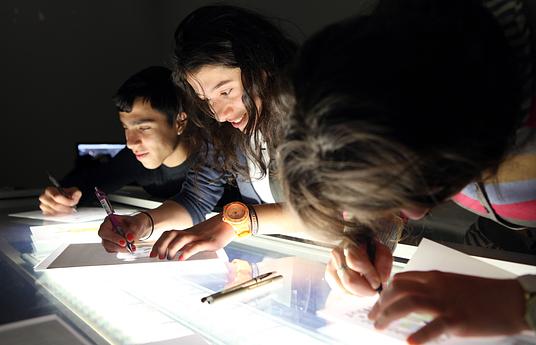Self-guided learning empowers individuals to take control of their education, allowing them to tailor their learning experiences to their unique needs, interests, and schedules. “It is incredibly important to empower young people to drive to their own self-discovery, learning about their strengths and aptitudes, understanding their affinities and loves, and understanding what big, hairy, audacious opportunities and challenges in the world speak to them, the places they would like to place their energy in order to make the world a better place,” says CAPS Network’s Corey Mohn.
Doing so requires tremendous trust, as CAPS is a flexible program that partners high school students with local enterprises. Schools must trust that students will take their learning seriously, and that the businesses they are paired with will act responsibly. Students must trust that they will be taken seriously and given opportunities to make an impact. Businesses must trust that young people have good, rich ideas and can execute them with the proper support.

CAPS gives students the chance to make real impacts in their local communities
CAPS works to build these connections, encouraging business owners to let students grapple with what the programme calls “the 10th thing on the to-do list.” These projects, where teachers and other trusted adults provide guidance on the side, have led to countless products and initiatives.
"It is incredibly important to empower young people to drive to their own self-discovery"
Corey relays one story of a group of high school students who were tasked with analyzing store data for a large tech retailer. “It turns out, what the students found in the haystack of data were three stores that were using electricity at an inordinate rate…. They recommended an audit and the company saved over $1 Million USD.”
The Role of Expert Guidance
Expert guidance in self-guided learning is not about dictating what to learn; rather, it's about facilitating the process of learning. Experts act as advisors, sounding boards, and resources, offering their knowledge and experience to help learners build upon their interests and goals. They provide a framework within which self-guided learning can flourish, offering strategies for effective learning, critical thinking, and problem-solving. TUMO Center, based in Armenia, offers a blueprint for how this can work.
Designed as a free after school program for teens, TUMO offers self-paced options for students to learn 14 creative, future-ready career fields including Web Development, Graphic Design, and Filmmaking. These are facilitated through self-learning modules, specialist-led workshops, and ad-hoc project labs that bring in top professionals in the relevant fields. Teens are encouraged to work across age groups, social backgrounds, and interests to collaborate and create products that could only arise out of serendipitous meetings.

Students work collaboratively and at their own pace at TUMO centres
Experts also play a crucial role in helping learners to set realistic and achievable goals. By leveraging their understanding of the subject matter and the learning process, they can help learners to craft a learning path that is both challenging and attainable, making sure that the portfolio of work they develop at the end is as rewarding as it is polished.
The Benefits of Self-Guided Learning
Self-guided learning encourages learners to become active participants in their education, fostering a sense of ownership and responsibility for their learning outcomes. It cultivates critical thinking and the ability to evaluate information critically, skills that are invaluable in today's fast-paced, information-rich world.
That’s what Ireland’s the B!G Idea focuses on, with a playful and creative twist. While TUMO is focused on hard skills and CAPS aims to provide direct impact on local communities, this innovation challenges teens to tackle the toughest hurdles that they will need to face in the future - climate change, mental health, hidden poverty.

The B!G Idea is designed to help teens take moonshots while building community
The B!G Idea is framed as an annual competition where students work in teams to identify a problem, brainstorm solutions, weigh the possibilities, and begin trials. In the process, students develop their skills for cooperation, design thinking, empathy, and creativity. They are encouraged to develop a Hero that they will serve, and to seek out the experts that can help them make informed choices along the way.
Self-guided learning with expert guidance, like the models offered by CAPS, TUMO, and the B!G Idea, helps students take charge of their education. It's not about going it alone, but about having the freedom to explore interests and build valuable skills like critical thinking and collaboration. By taking ownership of their learning journey, students become empowered to not just learn, but to make a real difference in the world. After all, the next million-dollar idea might just come from a self-directed student with a passion and a compass.
Learn more about the 2024 Global Collection.


